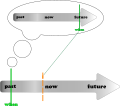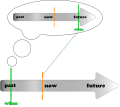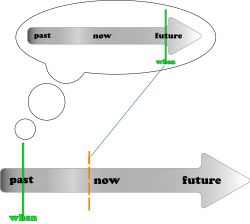User:Robbiemuffin/The tenses
-
the Relative tenses
Throughout this document, the following conventions are used:
- Inflection is used as a shorthand for time-deixis; That is, it is used as inflection or it's equivalent.
mnemonic: Inflection in this document is the parent-class of inflection.
- Grammatical tense is the inflective remedy in a language which relates the situational point in time in the sentence. Along with other time-diexises (which are highly theoretical [1][2][3]), it is a member of the classical grammatical tense:
Grammatical tense is a temporal linguistic quality expressing the time at, during, or over which a state or action denoted by a verb occurs.
Tense is one of at least five qualities, along with mood, voice, aspect, and person, which verb forms may express.
mnemonic: Grammatical tense in this document is the child-class of grammatical tense.
- A particular Category of tenses, the X tenses, is a category of inflexive remedies (i.e., a general means of time-diaxis, including null inflection) used to express sentences across situational points.
- Individual Tenses within the X tenses relate a general inflective remedy used for a specific situational point.
- A language's actual Specific Tenses are members of these sub-categories.
- A language has a specific tense if there is a proper remedy to demark the tense which is uniform across all regular sentences and is not simply a compound form of other tenses.
Thus,
- The Present tense of English is a specific tense, which
- Is circumstantially equivalent to the Present tense, but is a Nonpast tense because English lacks a distinct future inflection, and
- Is a member of the Absolute tenses
the General Model[edit]
 |
 |
| the Absolute tenses |
 |
 |
| the Relative tenses |
Grammatical tenses instantiate in a sentence a situational point in time from which the action occurs. The Absolute tenses are deictic; the center of deixis may be either the moment of discourse or narration or the moment under discussion. Through its verb, an absolute tense reflects the relative situational point to the context.
All languages have either absolute tenses, or they are tenseless. A language with the Absolute tenses (as opposed to tenseless languages) may use the Absolute tenses relative to the point of context, the Relative tenses, or it may use both, in order to express action in a context relative but distinct to the present moment.
* from here forward, tenseless languages are not part of the coverage.
The Relative tenses are anaphoric; the center of time is determined contextually. A Relative tense keeps the tense of the action.
Both forms (the Relative tenses and the Absolute tenses) can fully, or at least nearly, express any time appropriate for an action. The following illustration (from [4]) should make clear the difference.
- Context words are in orange.
- Verb words are in green.
In absolute tense languages the time will be made to agree with the context: Here the expression of the lemma to go changes relative to the context, such that the context word is redundant to the inflection of the verb.
“ Yesterday by 3:00, they had gone to the supermarket. ”
“ Tomorrow at 3:00, they will have gone to the supermarket. ”
In relative tensed languages the expression of to go does not change, but it's interpretation changes relative to the context:
“ Yesterday by 3:00, they to gopast to the supermarket. ”
“ Tomorrow at 3:00, they to gopast to the supermarket. ”
Most major languages will be found to be of the Absolute tenses (incorporating and defaulting to some tenses that are absolute). Less are of the Relative tenses, and arguably some languages incorporate both without overly favoring the one over the other (v.g., Russian).
The Absolute-Relative tenses are the absolute tenses only used to describe the moment under discussion when it is separate from the current moment or the narrative now. If a language does not synthesize these references through multiple simpler forms, than it is said to have tenses that are of the Absolute-Relative tenses.
Next to the tenses from the Absolute-Relative and the Relative, the tenses from the Absolute might be mnemonically thought of as the Simple tenses for two reasons. One need not a contextual inference, nor a second verb, nor even a relative context to state things in these tenses. Secondly, the Relative tenses and often the Absolute-Relative tenses require a verb conjugated in a Simple tense.
Meet the Tenses[edit]
the Absolute Tenses[edit]

transcluded from User:Robbiemuffin/The tenses/The Absolute tenses
the Past[edit]
 |
Any time, and all time, before now.
|
the Present[edit]
the Future[edit]
 |
Strictly after the current moment.
|
NonPast[edit]
NonFuture[edit]
 |
At or before now. The opposite of the future.
Note this is a fairly rare tense, linguists had hypothesized languages might have this tense but they had to actually discover examples. |
Not-Yet[edit]
Still[edit]
 |
Indicates a situation held to be the case, at or immediately before the utterance.
Language with a Still (by inflection) Luganda |
the Absolute-Relative Tenses[edit]

Any tensed language is sufficient to express almost any state-full relation, and so there is always a way to address a relative state from a language with "Simple" tenses, but usually this is done through auxiliaries, for example: in english, the Future Perfect. Other languages incorporated the auxiliaries into their inflections directly, becoming true tenses of the language. These are the Absolute-Relative tenses.
transcluded from User:Robbiemuffin/The tenses/The Absolute-Relative tenses
* note there is no future in the future tense. That is because no natural language has one. Internet memes die hard.
Future Perfect[edit]
 |
The future perfect tense is used to describe an event that has not yet happened but which is expected or planned to happen before another stated occurrence.
|
Past Perfect[edit]
 |
The pluperfect tense (from Latin plus quam perfectum more than perfect), also called past perfect in English, is a perfective tense that exists in most Indo-European languages, used to refer to an event that has completed before another past action.
Language with a Past Perfect (by inflection) Galician |
Future in the Past[edit]
Future Perfect in the Past[edit]
 |
Expresses a past action which is future with respect to a past action which itself is prior to another past action. An example might help: John left for the front; by the time he should return, the field would have been burnt to stubble.
|
the Relative Tenses[edit]

The simple absolute tenses determine the different types of relative tenses. Eg, if English could be found to be of the Relative tenses, then it would have a relative-past, and a relative-nonpast tense. (In other words, the context point can be anywhere in time, but how that context point's point of insertion looks from within the language depends upon the language's native simple tenses.)
References[edit]
- ↑ tenseless system
- ↑ Theories of Time
- ↑ Generative grammar
- ↑ http://www.humnet.ucla.edu/humnet/aflang/Hausa/Hausa_online_grammar/Tenses/tenses.html Meaning and Marking of Hausa Tenses





